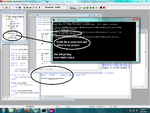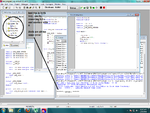btbass
Advanced Member level 5

No, your header file will be the same.
You just need the command line to compile your lcd code into a library as Mplab does not support the Hi-Tech 'libr.exe' program.
Then you add the library file to your project in the project window.
Library files are used all the time, such as 'stdlib.h', 'string.h', stdio.h' to name a few.
When using a library, the linker will only link in the code for the functions that are called by your program.
Mplab does support the Mplab C30 librarian, so you can make a library from within Mplab.
You just need the command line to compile your lcd code into a library as Mplab does not support the Hi-Tech 'libr.exe' program.
Then you add the library file to your project in the project window.
Library files are used all the time, such as 'stdlib.h', 'string.h', stdio.h' to name a few.
When using a library, the linker will only link in the code for the functions that are called by your program.
Mplab does support the Mplab C30 librarian, so you can make a library from within Mplab.




